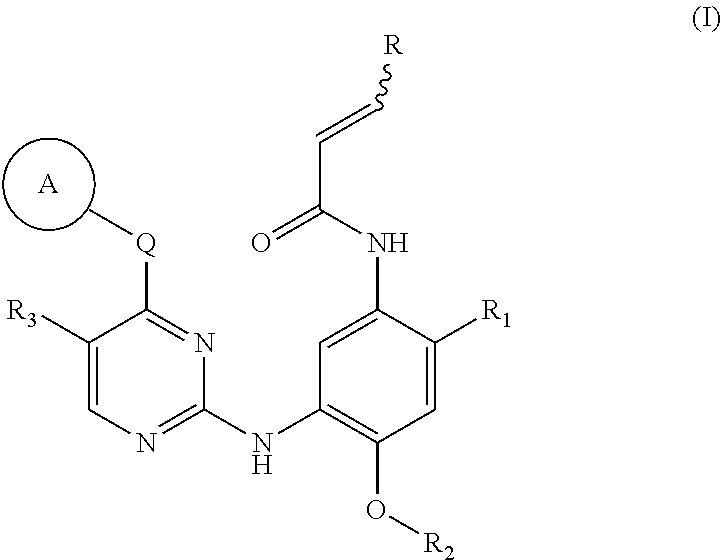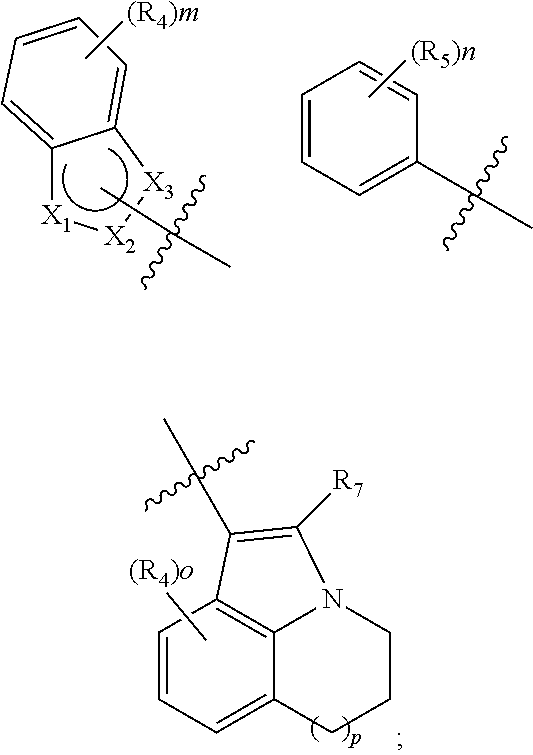EGFR inhibitor, preparation method and use thereof
a technology of egfr inhibitor and preparation method, which is applied in the field of egfr inhibitor, can solve the problems of ineffectiveness of afatinib, no therapeutic efficacy, and no treatment effect of tumor recurrence or disease progression
- Summary
- Abstract
- Description
- Claims
- Application Information
AI Technical Summary
Benefits of technology
Problems solved by technology
Method used
Image
Examples
preparation examples
Example 1
Preparation of N-(4-(difluoromethoxy)-5-((4-(1-methyl-1H-indol-3-yl)pyrimidin-2-yl)amino)-2-(4-methylpiperazine-1-yl)phenyl)acrylamide
[0184]
Step 1: Preparation of 2-(difluoromethoxy)-N4-(2-(dimethylamino)ethyl)-N4-methyl-N1-(4-(1-methyl-1H-indol-3-yl)pyrimidin-2-yl)-5-nitrobenzene-1,4-diamine
[0185]
[0186]N-(2-(difluoromethoxy)-4-fluoro-5-nitrophenyl)-4-(1-methyl-1H-indol-3-yl)pyrimidin-2-amine (250 mg, 0.58 mmol) was dissolved in DMF, followed by addition of diisopropylethylamine (150 mg, 1.16 mmol) and trimethylethylenediamine (120 mg, 1.16 mmol). The reaction was heated up to 120° C. by microwave and reacted for 30 minutes. After LC-MS showed completion of the reaction, the reaction solution was concentrated to dryness. The resulting residue was extracted with dichloromethane (10 mL) and H2O (10 mL). The organic phase was purified by preparative thin-layer chromatography to obtain the product 2-(difluoromethoxy)-N4-(2-(dimethylamino)ethyl)-N4-methyl-N1-(4-(1-methyl-1H-indo...
example 2
Preparation of N-(4-(difluoromethoxy)-5-((4-(1-methyl-1H-indol-3-yl)pyrimidin-2-yl)amino)-2-(4-methylpiperazine-1-yl)phenyl)acrylamide
[0193]
Step 1: Preparation of N-(2-(difluoromethoxy)-4-fluoro-5-nitrophenyl)-4-(1-methyl-1H-indol-3-yl)pyrimidin-2-amine
[0194]
[0195]3-(2-chloropyrimidin-4-yl)-1-methyl-1H-indole (250 mg, 1.0 mmol), 2-(difluoromethoxy)-4-fluoro-5-nitroaniline (230 mg, 1.0 mmol) and p-toluenesulfonic acid monohydrate (200 mg, 1.1 mmol) were dissolved in 2-pentanol (2 mL). The reaction was heated up to 120° C. by microwave and reacted for 1 hour. After LC-MS showed completion of the reaction, the reaction solution was cooled to room temperature naturally, and a dark solid was precipitated. The solid was filtered, and the filter cake was washed with methanol (1 mL) and methyl tert-butyl ether (1 mL) to obtain the crude product N-(2-(difluoromethoxy)-4-fluoro-5-nitrophenyl)-4-(1-methyl-1H-indol-3-yl)pyrimidin-2-amine (250 mg).
Step 2: Preparation of N-(2-(difluoromethoxy)-4-...
example 3
Preparation of N-(4-(difluoromethoxy)-2-(methyl(2-(3-carbonylmorpholino)ethyl)amino)-5-((4-(1-methyl-1H-indol-3-yl)pyrimidin-2-yl)amino)phenyl)acrylamide
[0204]
Step 1: Preparation of 4-(2-((5-(difluoromethoxy)-4-((4-(1-methyl-1H-indol-3-yl)pyrimidin-2-yl)amino)-2-nitrophenyl)(methyl)amino)ethyl)morpholin-3-one
[0205]
[0206]N-(2-(difluoromethoxy) 4-fluoro-5-nitrophenyl)-4-(1-methyl-1H-indol-3-yl)pyrimidin-2-amine (200 mg, 0.46 mmol), 4-(2-(methylamino)ethyl)morpholin-3-one (110 mg, 0.69 mmol) and diisopropylethylamine (180 mg, 1.4 mmol) were dissolved in DMF. The reaction was heated up to 120° C. by microwave for 30 min. After LC-MS showed completion of the reaction, the reaction solution was concentrated. The resulting residue was purified by preparative thin-layer chromatography to obtain the product 4-(2-((5-(difluoromethoxy)-4-((4-(1-methyl-1H-indol-3-yl)pyrimidin-2-yl)amino)-2-nitrophenyl)(methyl)amino)ethyl)morpholin-3-one (100 mg, 38%).
Step 2: Preparation of 4-(2-((2-amino-5-(dif...
PUM
| Property | Measurement | Unit |
|---|---|---|
| chemical shift | aaaaa | aaaaa |
| temperature | aaaaa | aaaaa |
| pH | aaaaa | aaaaa |
Abstract
Description
Claims
Application Information
 Login to View More
Login to View More - R&D
- Intellectual Property
- Life Sciences
- Materials
- Tech Scout
- Unparalleled Data Quality
- Higher Quality Content
- 60% Fewer Hallucinations
Browse by: Latest US Patents, China's latest patents, Technical Efficacy Thesaurus, Application Domain, Technology Topic, Popular Technical Reports.
© 2025 PatSnap. All rights reserved.Legal|Privacy policy|Modern Slavery Act Transparency Statement|Sitemap|About US| Contact US: help@patsnap.com



